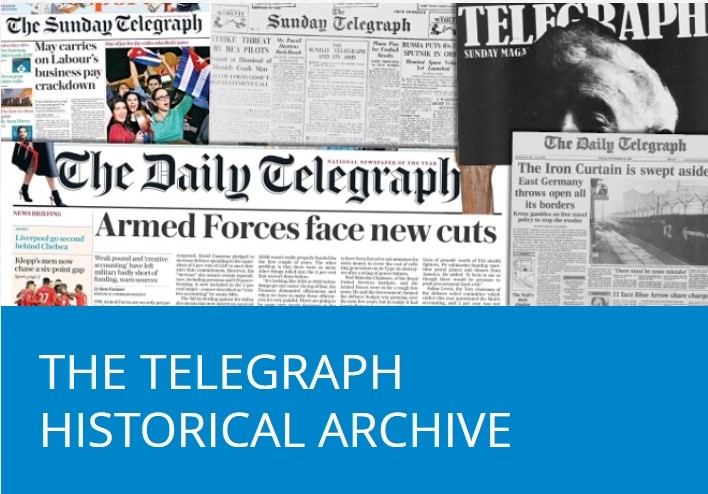
Impressum
Kundeninformation
 |
|
|||
The Telegraph Historical Archive, 1855-2021 |
Kontakt/Bestellung |
|
Online |
|
|
Inhalt :: Content Online-Service mit Zugang zu sämtlichen Ausgaben der britischen Tageszeitung "The Daily Telegraph" und seiner Vorgänger "The Daily Telegraph and Courier", "The Daily Telegraph and Morning Post" im kombinierten Volltext- und Faksimileformat von der Gründung 1855 bis 2021 mit einem Gesamtumfang von rund 1 Million Seiten. Enthalten ist auch die Sonntagsausgabe "The Sunday Telegraph" seit 1961. Der "Telegraph" gilt als traditionell rechtskonservativ ausgerichtet und politisch in der Nähe der Conservative Party (Tories). |
 |
|
Verlag :: Publisher Gale Cengage |
|
|
Preis :: Price Preise auf Anfrage / Prices on request |
|
|
Das Angebot richtet sich nicht an Verbraucher i. S. d. § 13 BGB und Letztverbraucher i. S. d. PAngV. |
|
|
Bestellnummer bei digento :: digento order number 108906 |
|
|
Verlagsinformation :: Publisher's information The Telegraph Historical Archive is the fully searchable digital archive of what was once the world's largest-selling newspaper. Researchers and students can full-text search across 1 million pages of the newspaper's backfile from ist first issue to the end of 2021, including issues of the Sunday Telegraph from 1961. Further extending Gale's coverage of quality UK newspaper press, The Telegraph is a superb complement to Gale's other historical newspapers, providing an alternative voice for researchers to titles such as The Times and the Daily Mail. With the new 2017 to 2021 supplement, researchers can now explore many of the events that define the early 21st century.
In 1908, the Daily Telegraph published an infamous interview with Kaiser Wilhelm, the German chancellor who alienated the British public with such uncensored comments as "you English are mad, mad, mad as march hares." During World War II, the cryptic crossword puzzle used to recruit Allied codebreakers was published in the Telegraph. In recent years, the Telegraph published a series of articles on the "Lockdown Files", a collection of more than 100,000 messages from the then Health Secretary Matt Hancock. These articles provide not just insight into the inner workings of the government during the height of the COVID-19 pandemic, but the public reaction to their efforts to slow its spread. The Telegraph also included many notable contributors, such as George Augustus Sala. One of the most famous journalists of the nineteenth century, Sala pioneered a more lively, personal style of writing and reported from all over the world. He is also celebrated for his coverage of the US Civil War. In addition, Sir Winston Churchill's first journalistic attempts were contained within the pages of The Telegraph, written when he was a twenty-two-year-old army officer.
|
|